May 18, 2021 | Alumni
Samra Zafar is U of T Mississauga’s Outstanding Young Alum of 2021
By Negin Neghabat-Wolthoff
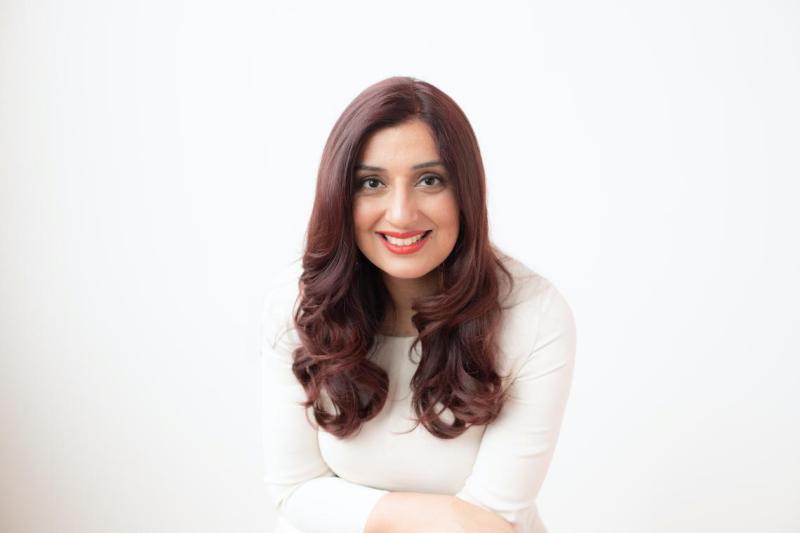
Samra Zafar (BSc 2013 UTM, MA 2014) is a survivor, author of a best-selling memoir, and founder of the nonprofit Brave Beginnings. Photo Credit: Emily D Photography
Entrepreneur, author, public speaker and a renowned advocate for gender equity, mental health and human rights – that’s who Samra Zafar (BSc 2013 UTM, MA 2014) is at age 39. The fact that her path toward an education was paved by extreme adversity only shines more light on her incredible accomplishments.
A teen bride at age 16, Zafar survived ten years in an abusive relationship before she succeeded in escaping her marriage with her daughters. Resilience, determination and planning led her to U of T Mississauga, to eventually graduate as the John H Moss Scholar in 2013 (an annual award given to the most outstanding graduating student across all three U of T campuses), and to, subsequently, go on to obtain her master's at U of T. She generously credits UTM as the place that changed her life and she continuously gives back through various volunteer roles she has held over the years, including the position of alumni governor on U of T’s Governing Council, and the current chair of the UTM Campus Council.
Considering herself on a path to entrepreneurship, she is currently working on several projects including the audiobook and TV series production of her novel, writing her next book, as well as developing courses around mental health, gender-based violence, and resilience. In parallel, she is managing a non-profit for women who are abuse survivors.
Congratulations on being named winner of the 2021 Desmond Parker Outstanding Young Alumni Award! what does this award mean to you?
It means so much more than any other award because, for me, UTM was something like a birthplace. When I came to Canada, as a teen bride, living in Streetsville, Mississauga, never allowed to go out of the house, feeling very lost and scared, my one dream was attending university. Every time we drove by UTM, I was longingly looking at the campus from the back of the car, especially when it was graduation time and all the posters and banners were out.
At age 26, after fighting many battles, I was finally allowed by my in-laws to attend a single UTM class. With strict instructions, not to talk to anyone, not to make friends, not to raise my hand in class, I walked into ECO100 (Introduction to Economics). Sitting in that classroom, meeting other students, and talking to my professor, it felt like the first time in my life that I was treated with respect. This gradually built up my confidence and, eventually, led to my freedom.
As a teen bride never allowed to go out of the house, my one dream was attending university
One day, I came across a sign at UTM’s Health and Counseling Centre, with a few questions along the lines of, ‘Do you feel lost or intimidated, or have you lost your voice?’ When I sought help there, I learned that what I was facing at home was abuse. It took two years of counseling to gain the courage and understanding that my daughters and I deserved better than to live in constant fear, before leaving my husband.
When I finally decided to leave, UTM came through for me once again by providing me with on-campus housing in the middle of the summer. On the verge of homelessness, at age 28, my 10- and 5-year old daughters and I finally had a place we could call home. I remember sitting in the middle of my living room at Schreiberwood Residence and crying with relief and happiness.
UTM was my life line – I felt reborn there! I still walk around UTM when I need comfort and inspiration
It was an accumulation of moments – not just the counseling I received, but the kind words of a professor when I was losing confidence, or the innumerable, endless conversations I had with my Economics advisor, Ruby Mack, or something as small as a new friend stopping by with ice cream. What abuse survivors need is a sense of community, and UTM gave me exactly that.
UTM was my life line – I felt reborn there! I still walk around UTM when I need comfort and inspiration.
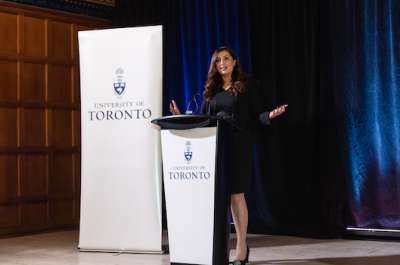
You also received the Top 25 Canadian Immigrant Award in 2019. Incredibly well-deserved considering your beginnings in Canada. Do you want to tell us more?
Canada was, initially, my prison, but it also became my saviour. I moved here, as a teen bride, from the United Arab Emirates, being originally from Pakistan, with false promises I was given, that my husband would let me finish high school and attend university. Instead, I was locked up with no access to education.
The only place I was allowed to take my daughter was the Ontario Early Years Centre, and, through the little freedom that gave me, I met kindness among strangers at the centre and beyond. One story I like to tell is this one: in the early years of my marriage, my husband’s family never gave me any spending money, but I collected coins I could find around the house, so that, one day, I was really proud to have enough to buy my daughter a donut on the way home from the Early Years Centre. But, the moment she had taken her first bite and I reached into my purse, I realized the money wasn’t there. I was mortified – it had taken me so much courage to even walk in – but, immediately, another customer behind me covered the expense without any hesitation. That’s what Canada was to me in the beginning: a lot of darkness, but also unexpected kindness from strangers that became rays of hope.
Almost exactly 10 years after arriving in Canada, I had saved enough to take a single class at UTM, and that changed everything
From there, it was quite a journey to be able to finish high school. I would order my courses from the Independent Learning Centre and, after completing all my chores, I would go into my room and study when my daughters were asleep.
It took me several years to finish my high school course work and several more years to save up the amount I needed for part-time tuition at UTM. OSAP – the Ontario Student Association Program – wasn’t an option because our household income was above the threshold, but, of course, I had no access to that money. A flyer on a community board, for babysitting services, gave me an idea. The only type of job I was permitted to do was from within the house, so I offered babysitting at my home, grew my clientele on Kijiji, and saved whatever earnings I could secretly stash away. Almost exactly 10 years after arriving in Canada, I had saved enough to take a single class at UTM, and that changed everything.
So that’s my immigrant story; I found my community and life at UTM. I owe a lot to this country and I’m as proud a Canadian as I can be!
And it must have been another incredible validation to be named among 2019’s Top 100 Most Powerful Women?
Yes, that award was incredibly meaningful! Power, to me, is about empowering others, about using your voice for change, speaking up to spark dialogue for progress. It is not about job titles, hierarchies, degrees, or any of that. So, the fact that I won an award for the work I do in empowering others meant a lot.
Power, to me, is about empowering others, about using your voice for change
That’s the biggest lesson I learned at UTM: that power is about responsibility, that with success comes accountability and a sense of duty to pay it forward.
Awards provide validation but are also a reminder of my responsibility, that there is so much more to be done. I now have a bigger platform where, hopefully, I can touch more lives and effect more change.
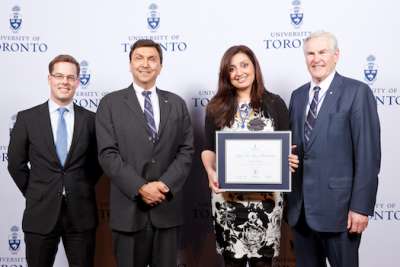
You are the founder of Brave Beginnings, a non-profit mentorship organization for women who have survived abuse, violence or oppression. tell us about the organization?
Brave Beginnings was actually inspired by my time at UTM. On average, a woman goes back to her abuser seven times before fully leaving. The key to starting a new life is community. That’s what I found at UTM, and that’s what we provide at Brave Beginnings. We partner up with women’s shelters across Canada to identify abuse survivors, and then match the women with mentors to support them on their journey.
The key to starting a new life is community
Our guiding principle is empowerment. At Brave Beginnings, the women are in the driver seat. We don’t tell them what to do next, but we provide the support they need to take the next step they want to take.
We just completed our pilot in the GTA and it has been very successful; phenomenal stories are coming through! So, now we are expanding nationally.
You were working in the financial sector before, so it must have been quite a transition. Do you have any advice for others considering a career change?
Yes, it has been! And it’s not just Brave Beginnings – I would say, I’m on a path to entrepreneurship.
When you are in the corporate world, the path is, sort of, pre-designed; but in the entrepreneurial space, there’s a lot of ambiguity; you learn and redefine as you go along. It is challenging but also exciting and you have to be resilient and comfortable with hearing a lot of ‘no’s’ and ‘not yet’s.’
When I graduated from UTM, I took a job at RBC because I needed to build financial self-sufficiency. I enjoyed the work, the clients and teams, and I learned a lot. At the same time, my opportunities were growing in the area of speaking engagements, and the time came when I had to choose.
In the entrepreneurial space, there’s a lot of ambiguity; you learn and redefine as you go along
When I finally transitioned out of my corporate career, it was the right time for me; my kids were grown, I had confidence through my education and successes, and I owed it to myself to transition to this meaningful work.
My advice for others considering a transition would be this: do what you have to do in order to do what you eventually want to do. For me, it would have been reckless to attempt this earlier, but I built and prepared myself for this transition over many years.
My other advice is this: really understand your reasons. What is the problem you want to solve? Or the change you want to affect? Keep your vision on that purpose, that ‘north star’ – that’s what will help you get there. And keep your eyes on the next step. Every big goal is a culmination of many small steps.
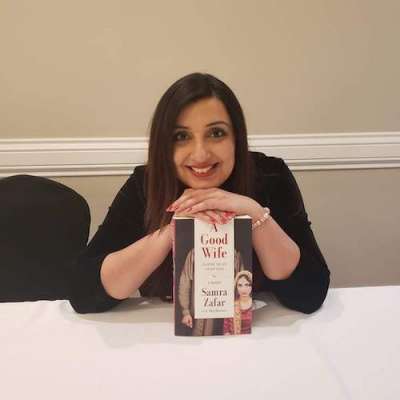
Giving back is a major focus of your endeavours, from your advocacy work for gender equity, inclusion, human rights and mental health to the volunteer work you do for your alma mater. What motivates you to give back?
What I went through is not unique; it’s the story of millions and millions of women. Each year, 12 million girls around the world are forced to become child brides. There are about 650 million women alive today who were child brides, and I’m one of them. In North America, 1 in 3 women have suffered violence from a partner; over half of all women will have suffered some kind of physical, sexual or emotional harassment or abuse at some point in in their lives. We all experience times of adversity where we feel marginalized or ostracized in some way, whether that’s as an immigrant, a racialized person, someone who identifies as LGBTQ+, or being an Indigenous person – just to name a few. Because of my personal experience, I have a deep understanding of adversity and exclusion.
The stories I get to hear about lives that my book or my work has touched – that’s my soul food
That’s what fuelled this deep fire in my belly after my time at U of T; I couldn’t stay quiet.
The other aspect is that giving back isn’t a one-way street. People say I give back so much, but I would say I get so much more in return. The stories I get to hear about lives that my book or my work has touched – that’s my soul food. I can’t imagine not being involved with volunteering; I feel privileged and honoured to do this work.
What does your volunteer work with UTM mean to you?
Even in my most tumultuous times, when I had just moved to the Schreiberwood Residence, feeling incredibly lost and alone, I was volunteering at UTM. In the Accessibility Centre, I was helping a 65-year-old woman who was blind and hearing-impaired, by typing up her assignments and taking her from class to class. I was mesmerized and inspired by her spirit and resilience, but it also gave me a sense of purpose, the idea that, even while I was facing adversity, I still had the capacity to add meaning to someone's life.
Even while I was facing adversity, I still had the capacity to add meaning to someone's life
When I started at UTM, my goals were simple: an education, a job, be able to put food on the table for my children. But then, during my studies, I became successful beyond my wildest dreams. These successes, while driven by hard work and resilience, were also coupled with a sense of duty toward everyone who helped me along the way – all the professors, mentors and friends who came into my life. I can’t pay them back, but I can pay it forward. I owe this campus a lot, and I will always be involved with UTM in some way or other.
Do you have any other fond memories from your student days at UTM?
My classes and professors stand out, of course. Gordon Anderson was my second-year professor; he still recalls my transformation during my student days. John Rothschild, who was the chair of the committee for the John H. Moss Scholarship, to this day, is still one of my biggest mentors. My fellow Alumni Governor, Harvey Botting, is a trusted friend who I often turn to for advice and encouragement.
All the people I met, and friends I made, are fond memories. I was working several jobs on campus, including being a teaching assistant, a student mentor, and managing the info booth at the Student Centre. The last one was one I had specifically requested – I worked there from 8 pm to 2 am, a very quiet time, which allowed me to study for classes.
I used to sell homemade biryani and butter chicken out of my residence...we had a fantastic community!
But, in addition to all that, I used to sell homemade biryani and butter chicken out of my residence. The idea was to earn a little money, but I also made friends that way. Some students were long-distance commuters and I’d let them stay at my place so they wouldn’t have to travel late at night. It was an ongoing joke, that my place was the Union Station of UTM because so many people were coming and going. I also bribed my friends with home-made food to watch my kids; we had a fantastic community!
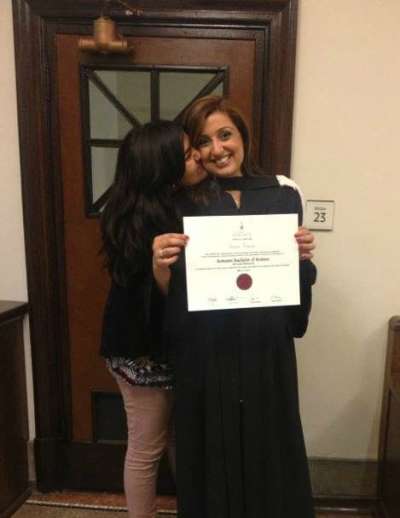
Speaking of your daughters, what does it mean to you to be a good role model to them?
My role as a mom is something that I hold integral to me. It is about modelling behaviour, leading by example, as well as being human. Perfection creates this impossible standard, something set by my mother when I grew up, and that’s not what I aim to be to my kids.
I’m very proud of my daughters, especially the sense of compassion they have acquired
My biggest job as a parent is to create an environment for them to thrive in, to be free, to love themselves and be okay with not being okay, letting them make their mistakes and carve their paths. I have their backs and, with that psychological safety behind them, their job is to figure things out themselves.
I’m very proud of my daughters, especially the sense of compassion they have acquired. They understand that, even if we can’t always solve other people’s problems, we can help by acknowledging others and giving them a chance to be heard.
You recorded your personal story in your national bestseller memoir A Good Wife. To say that you overcame adversity is an understatement, but do you have any advice for someone who has faced or is facing adversity?
Start with baby steps; think of small changes you can make to be kind to yourself and to help yourself. Then, keep trying; not trying again is the only failure. Build a good support network. Sometimes, that support network is not family, but people you meet along the way. Give back and pay it forward, and carve a path for others who walk with you or behind you. And, finally, be authentic. I learned this right after graduation; there was no way I could be like other graduates who were ten years younger and able to work longer hours because they had no other responsibilities. When I was trying to be like them, I wasn’t getting anywhere, but portraying myself as who I truly was, was my biggest success factor.
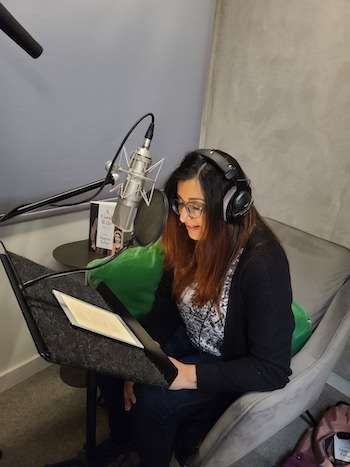
What is next for you? What are you currently working on?
I just finished recording the audiobook production of A Good Wife, and it is now available on Audible. It is also being adapted into a TV series and is currently in the scripting phase. So, I’m very excited to be involved with that.
In addition, I’m writing my next book. It will also be a memoir, but in the form of short stories about lessons I learned along the way, such as breaking free from cultural, societal and conditioning beliefs. The message is about cultivating a sense of self love, building boundaries and taking risks. It is also about unlearning, especially of concepts we learn in our childhood that hold us back from being our most authentic, free and empowered selves.
Maybe I’ll go back to school!
Children’s mental health is another interest that has built over time and that I’m cultivating now by developing online courses for parents whose kids struggle with mental health issues.
Of course, Brave Beginnings is keeping me busy, too!
Aside from all that – who knows; maybe I’ll go back to school!
The 2021 U of T Mississauga Alumni Awards of Distinction ceremony will be held virtually on Wednesday, June 2, 2021, at 6 pm. Learn more and register to attend the award ceremony or to receive the recording.

